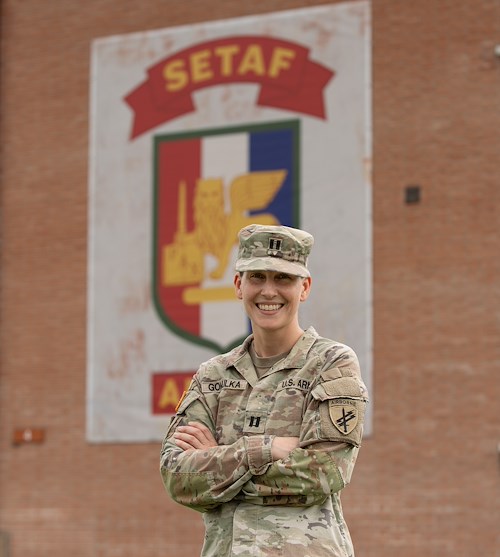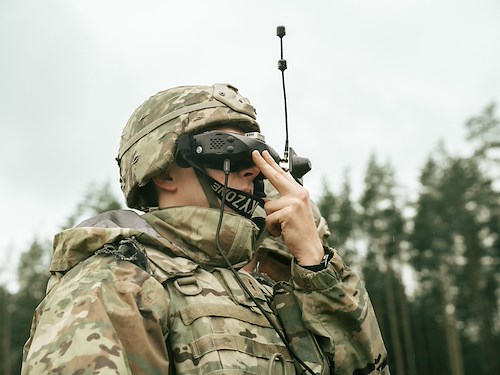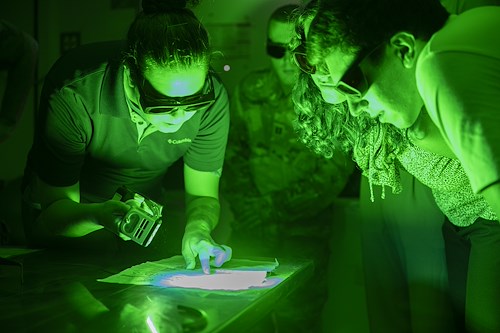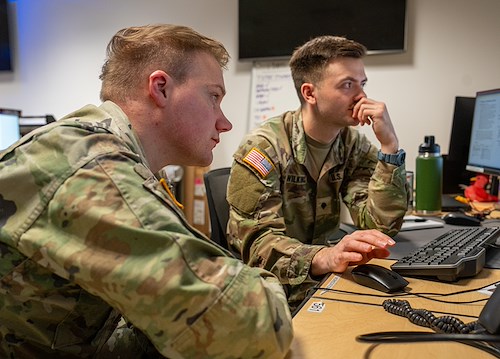Gallery contains 5 images
×
Photo 1 of 5
U.S. Army Southern European Task
U.S. Army Capt. Brooke Gomulka, a judge advocate with the Civil Affairs Battalion, U.S. Army Southern European Task Force, Africa (SETAF-AF), poses for a photo at Caserma Del Din, Vicenza, Italy, Aug. 27, 2025. (U.S. Army photo by 1st Lt. Katherine Sibilla)
Photo by: 1st Lt. Katherine Sibilla
Photo 2 of 5
U.S. Army Southern European Task
U.S. Army Capt. Brooke Gomulka, a judge advocate with the Civil Affairs Battalion, U.S. Army Southern European Task Force, Africa (SETAF-AF), discusses rule of law during a subject-matter expert exchange in Kampala, Uganda. The exchange strengthened professional relationships and allowed participants to share perspectives on military justice, human rights and the law of armed conflict. (Courtesy photo)
Photo 3 of 5
U.S. Army Southern European Task
U.S. military and Force de Défense Nationale du Burundi [Burundi National Defence Force] legal professionals pose for a photo after the conclusion of a two-day rule of law subject-matter expert exchange in Bujumbura, Burundi, Aug. 6, 2025. The exchange strengthened professional relationships and allowed participants to share perspectives on military justice, human rights and the law of armed conflict. (Photo courtesy of U.S. Embassy Burundi)
Photo 4 of 5
U.S. Army Southern European Task
U.S. Army Capt. Brooke Gomulka, a judge advocate with the Civil Affairs Battalion, U.S. Army Southern European Task Force, Africa (SETAF-AF), discusses rule of law during a subject-matter expert exchange in Lusaka, Zambia, July 25, 2025. The exchange strengthened professional relationships and allowed participants to share perspectives on military justice, human rights and the law of armed conflict. (U.S. Army photo courtesy of SETAF-AF Civil Affairs Battalion)
Photo 5 of 5
U.S. Army Southern European Task
U.S. Army and Zambia Defence Force legal professionals pose for a photo after the conclusion of a two-day rule of law subject-matter expert exchange in Lusaka, Zambia, July 25, 2025. The exchange strengthened professional relationships and allowed participants to share perspectives on military justice, human rights and the law of armed conflict. (U.S. Army photo courtesy of SETAF-AF Civil Affairs Battalion)
VICENZA, Italy—Few residents of Hagerstown, Maryland, realize their school board lawyer is also a superwoman of sorts. Monday through Friday, Capt. Brooke Gomulka serves as in-house counsel, but on weekends she dons a different cape as a U.S. Army Reserve judge advocate with the 360th Civil Affairs Brigade.
Currently, she is on a nine-month deployment with the Civil Affairs Battalion, U.S. Army Southern European Task Force, Africa (SETAF-AF) in Vicenza, Italy.
During her deployment, which began with six months in Camp Lemonnier, Djibouti, Gomulka led three rule of law subject-matter expert exchanges with military legal professionals in Uganda, Zambia and Burundi. In each country, she spent two days sharing U.S. practices and hearing how partners apply the rule of law in their own systems. To support the exchanges, she worked with fellow civil affairs Soldiers and legal experts from the Combined Joint Task Force - Horn of Africa, including a U.S. Marine Corps judge advocate.
“The intent of the engagements was to discuss rule of law through a subject-matter expert exchange,” Gomulka said. “Through those conversations, you really see how our system works and the rights we often take for granted in the U.S., like the guaranteed right to counsel. It was very eye-opening.”
In Uganda, the focus was on the law of armed conflict, command responsibility, military justice and peacekeeping operations. The exchange was built on several years of prior engagements, which allowed for deeper conversations and continuity with their legal professionals.
In Zambia, the dialogue turned to human rights and accountability. One Zambian colonel shared that without formal military legal schooling like the U.S. offers to its judge advocates, he struggled to guide junior attorneys on the law of armed conflict, an example that showed why these professional exchanges matter.
The Burundi exchange, where Gomulka said she felt the greatest reward, marked the country’s first engagement of this kind since 2016. She recalled that, by the second day, Burundian officers invited the U.S. team into their own facility for meaningful conversations.
Across all three countries, she was struck by the hospitality of her counterparts, who often shared traditional meals with the U.S. team.
“That was a great experience to learn about them and their culture outside of the legal discussions,” Gomulka said. “Burundi was especially rewarding. At first, the conversations were very surface level, but by the end they were inviting us into their spaces and engaging in real dialogue.”
Not only was this an eye-opening professional experience for Gomulka, but she also indicates that she grew as a person. As the only judge advocate assigned to SETAF-AF on the continent, she often had to develop her own operational plans.
“I had never planned missions before,” Gomulka said. “Just thinking through the process of mission execution is not something that a judge advocate is typically responsible for.”
She also left with new ideas to apply back home.
In Burundi, local legal officers showed her how they use visuals and diagrams to teach the law of armed conflict, an approach she now hopes to adapt for training U.S. Soldiers. Another surprise was discovering that many partner nations keep their military attorneys in central offices rather than embedding them with units.
“It was a very different approach than what we’re used to,” said Gomulka.
Although the deployment has been a significant professional experience, Gomulka admits she looks forward to a small taste of home, her favorite glazed donut from Krumpe’s in Hagerstown, before she hangs up her cape until the next mission.
Her story is a reminder that the U.S. Army is filled with ordinary people doing extraordinary things.



















